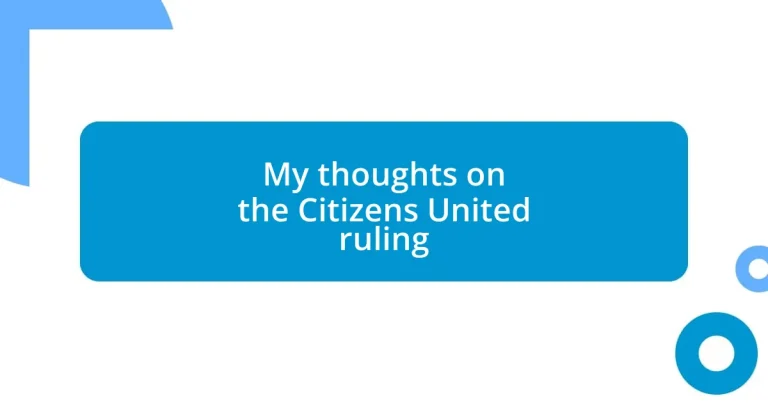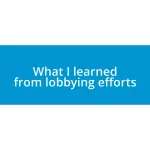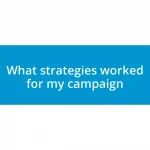Key takeaways:
- The Citizens United ruling in 2010 allowed unlimited corporate and union spending on political ads, equating money with free speech.
- This led to a rise in Super PACs that operate without donor transparency, amplifying the influence of wealthy donors over ordinary voters.
- The ruling has shifted the political discourse towards extreme positions, making it challenging for diverse voices to gain traction.
- There is an urgent need for campaign finance reform to address the dominance of money in politics and enhance transparency.
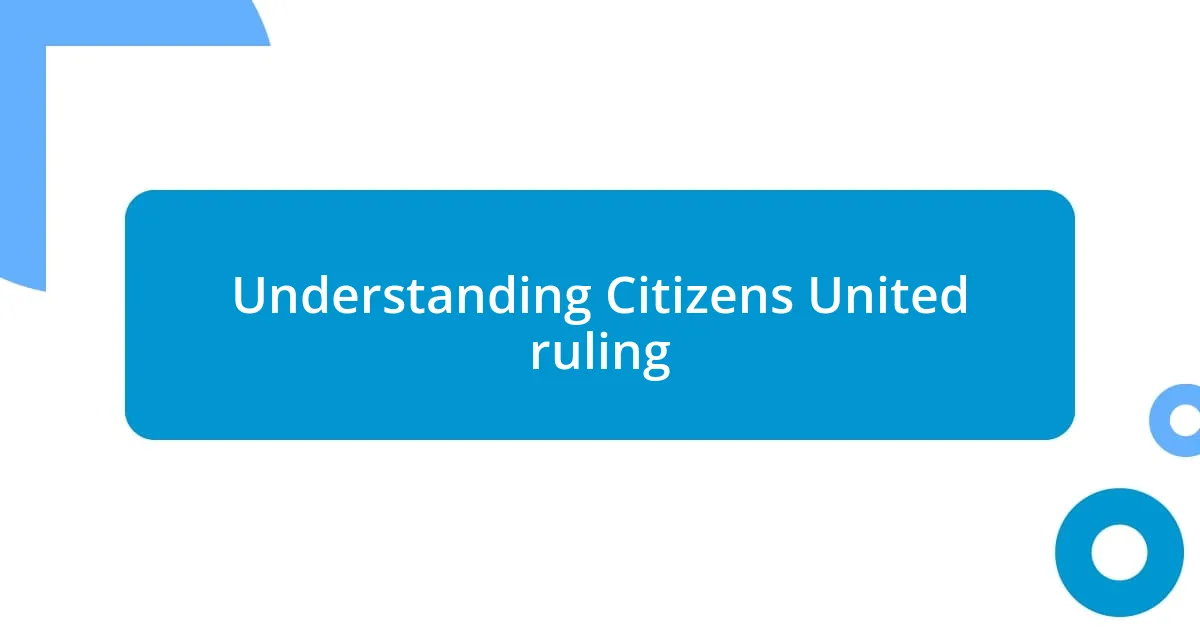
Understanding Citizens United ruling
The Citizens United ruling, decided by the Supreme Court in 2010, fundamentally shifted the landscape of campaign finance in the United States. This decision effectively equated money with speech, allowing corporations and unions to spend unlimited amounts on political advertising. I remember feeling a mix of disbelief and concern when I first learned about it—how could our political landscape be influenced so heavily by entities with vast resources, rather than by individual voters?
When I think about the implications of this ruling, I can’t help but wonder how it affects the average citizen’s voice in the electoral process. Does spending power overshadow the concerns of everyday voters? In my experience, it often feels like a small group of wealthy donors has a louder voice than many of us combined. I’ll never forget attending a town hall meeting where issues raised by constituents seemed to fade into the background when competing against the noise from well-funded lobbyists.
The financial playing field, post-Citizens United, has led to a surge in Super PACs—organizations that can raise and spend unlimited funds—but there’s a catch; they don’t have to disclose their donors. This lack of transparency makes me uneasy. I often find myself pondering: if we don’t know who’s backing these expenditures, how can we trust the political process? Wouldn’t it be more reassuring if voters could trace the money that shapes their candidates and causes? The emotional toll of feeling powerless in such a complex system is something many people share, and it drives me to advocate for a more balanced democratic process.
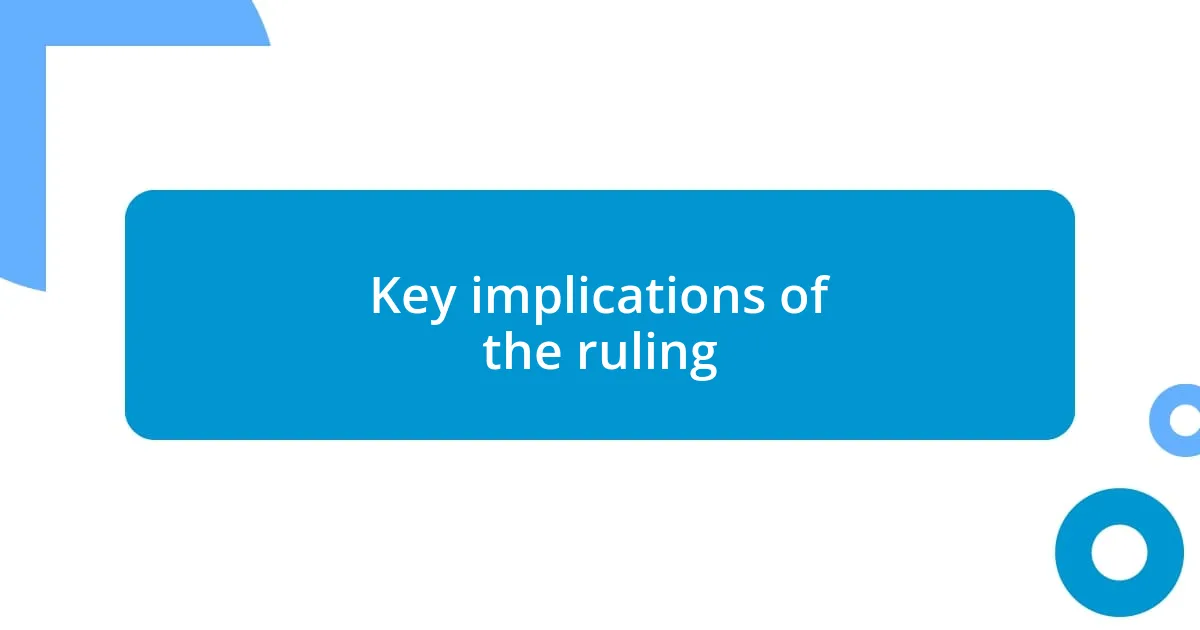
Key implications of the ruling
The ruling’s implications stretch far beyond just the influx of money into politics; it’s about who gets heard and who doesn’t. For me, it highlights a troubling trend where the voices of ordinary citizens are drowned out by the megaphones of corporate interests. During a community event I attended recently, I noticed how discussions on vital social issues were often overshadowed by flashy ads promoting candidates who might not even align with the constituents’ values. This scenario makes me genuinely worried about the future of civic engagement.
Key implications of the Citizens United ruling include:
- Increased Influence of Wealthy Donors: Political power has shifted towards those with deep pockets, leaving the general populace feeling marginalized.
- Rise of Super PACs: These groups can raise unlimited funds, often promoting candidates or causes based on personal interests rather than community needs.
- Lack of Transparency: With anonymous donations, voters are often left in the dark about who funds political campaigns, complicating informed decision-making.
- Polarization of Political Discourse: The amplified voices of moneyed interests can lead to more extreme positions, making meaningful compromise and dialogue harder to achieve.
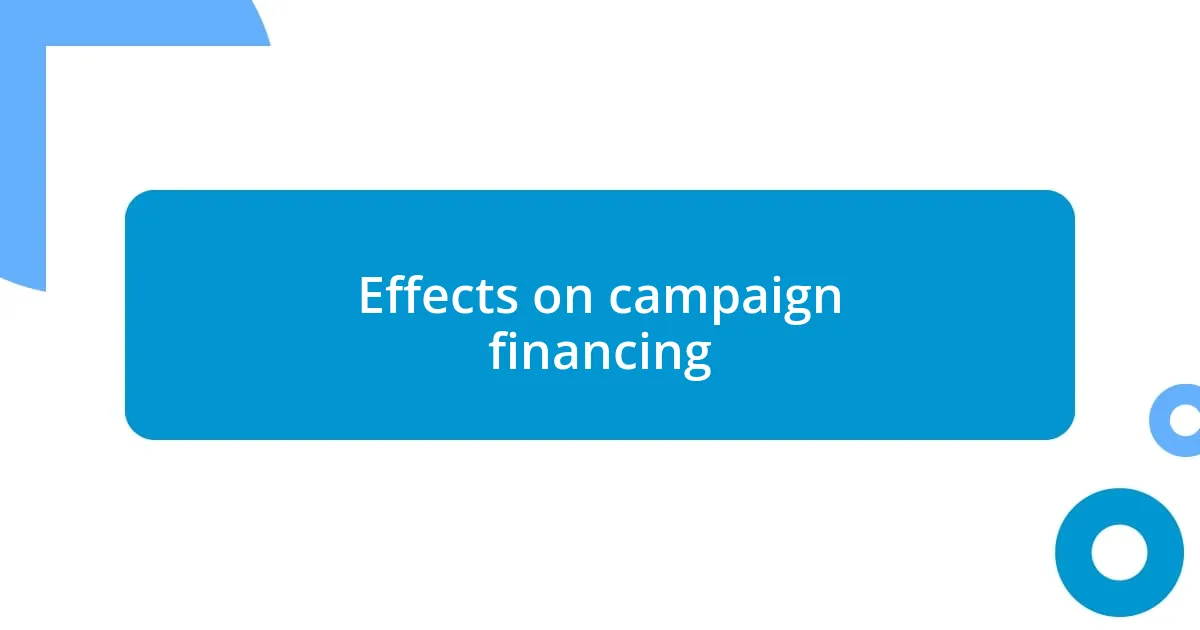
Effects on campaign financing
The effects of the Citizens United ruling on campaign financing are profound and unsettling. I’ve seen how campaign budgets have exploded, where candidates are now almost entirely at the mercy of their financial backers. It reminds me of a recent election cycle where a local candidate, despite having strong community support and a compelling vision, struggled to make waves against an opponent backed by a multi-million dollar Super PAC. It almost felt like the heart of democracy was being overshadowed by a financial race, causing me to reflect on what truly matters in a representative system.
Moreover, the ruling has created an environment where the mere presence of money can dictate the narrative of a campaign. I recall attending a debate where the topics discussed were largely shaped by the interests of major donors rather than the pressing concerns of the voters. It struck me that the very issues impacting our everyday lives were being sidelined. The candidates, seemingly more focused on appeasing their wealthy sponsors, presented far removed solutions to problems that, in my opinion, needed grassroots attention. It’s disheartening to think that the voices of the everyday voter are often muffled beneath the weight of financial clout.
Looking at the broader picture, one can’t ignore how campaign financing has fostered a culture of partisanship, amplified by the financial incentives tied to extreme viewpoints. I remember feeling a deep sense of frustration when discussing important policies with friends. Their perspectives seemed to be influenced not by facts, but by how candidates framed issues based on who funded their campaigns. It left me questioning if we are genuinely addressing our societal needs or merely catering to the whims of our wealthiest backers.
| Aspect | Before Citizens United | After Citizens United |
|---|---|---|
| Campaign Funding | Limited to strict donation limits | Unlimited spending by corporations and unions |
| Influence of Donors | Varied donor influence | Wealthy donors dominate political discourse |
| Voter Engagement | Stronger citizen participation | Citizen voices often drowned out |
| Transparency | Mandatory donor disclosure | Anonymous donations, less accountability |
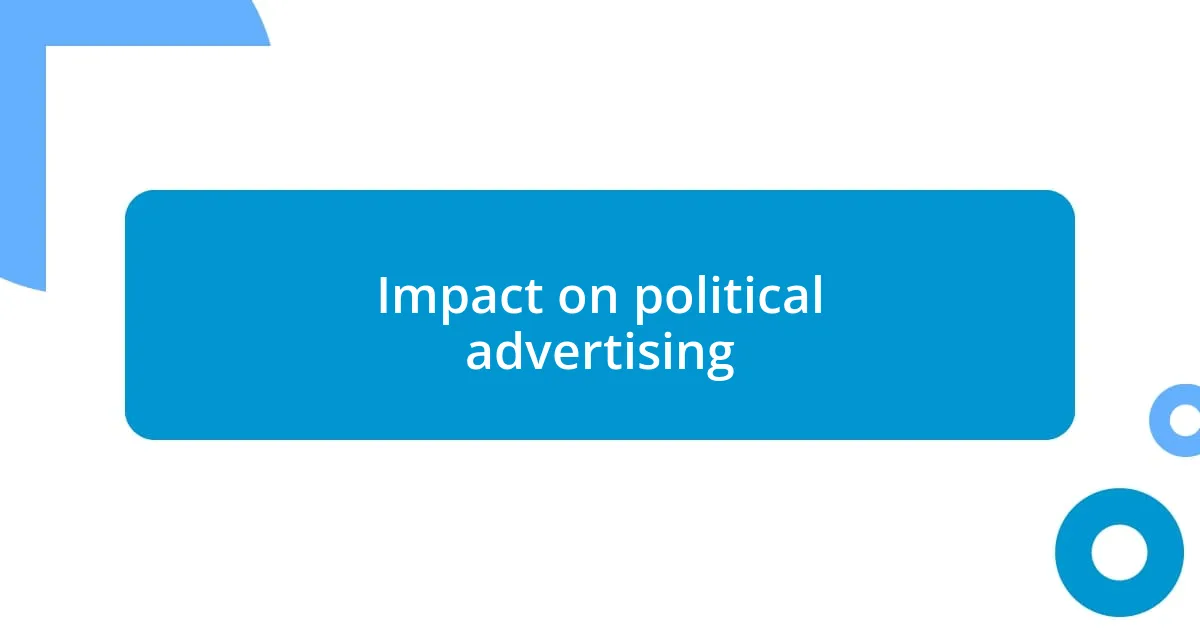
Impact on political advertising
The impact of the Citizens United ruling on political advertising is unmistakable. I’ve observed firsthand how campaign ads have morphed into a powerful tool, prioritizing slick production over substantive dialogue. In a recent election cycle, I found myself bombarded with commercials that seemed more like entertainment than informative pieces. I often wondered, are voters truly getting the information they need to make informed choices, or are we merely being dazzled into submission?
What strikes me most is how the rise of Super PACs has distorted the landscape of political messaging. I recall chatting with a friend who mentioned feeling disillusioned after seeing an ad that focused solely on personal attacks rather than issues important to our community. It made me think: does crafting negative ads really serve our democracy? Instead of fostering a healthy exchange of ideas, these ads often cultivate a sense of division. When the focus shifts from policies to personal vendettas, how can we expect voters to engage in meaningful discussions?
Transparency, or rather the lack thereof, is another critical aspect of political advertising post-Citizens United. I remember a conversation during a town hall meeting where attendees expressed frustration over not knowing who was financing various campaigns. It leads me to a concerning question: how can we trust candidates to represent our interests when their funding sources remain hidden? It’s a challenge that I believe hinders our ability to hold politicians accountable and undermines the very essence of democratic engagement.

Supreme Court’s rationale for decision
The Supreme Court’s rationale in the Citizens United ruling stemmed from the belief that political spending is a form of free speech protected under the First Amendment. I always think about how the justices viewed corporations and unions as representations of individual voices in the political arena, not something to be constrained. It puzzles me, though—are we truly amplifying diverse opinions, or are we just giving voice to those with the deepest pockets?
What struck me is how the Court argued that limiting corporate funding would hinder the marketplace of ideas, creating an uneven playing field. I recall feeling a mix of hope and skepticism when I first heard this argument. On one hand, I understand the value of open discourse, yet part of me wondered—aren’t we only allowing a select few to dictate the conversation? It’s a complex balancing act that seems to tip heavily in favor of wealth rather than genuine representation.
The decision emphasized that transparency isn’t necessarily required for donations, as long as the spending is independent of candidates. This reasoning makes me reflect on my experiences attending local fundraisers. It’s alarming to think that those who might manipulate the truth behind a candidate’s funding can do so with little oversight. How can we ensure informed choices when the origins of influential money remain shrouded in mystery? The implications of this logic continue to weigh on my mind as I navigate today’s political landscape.
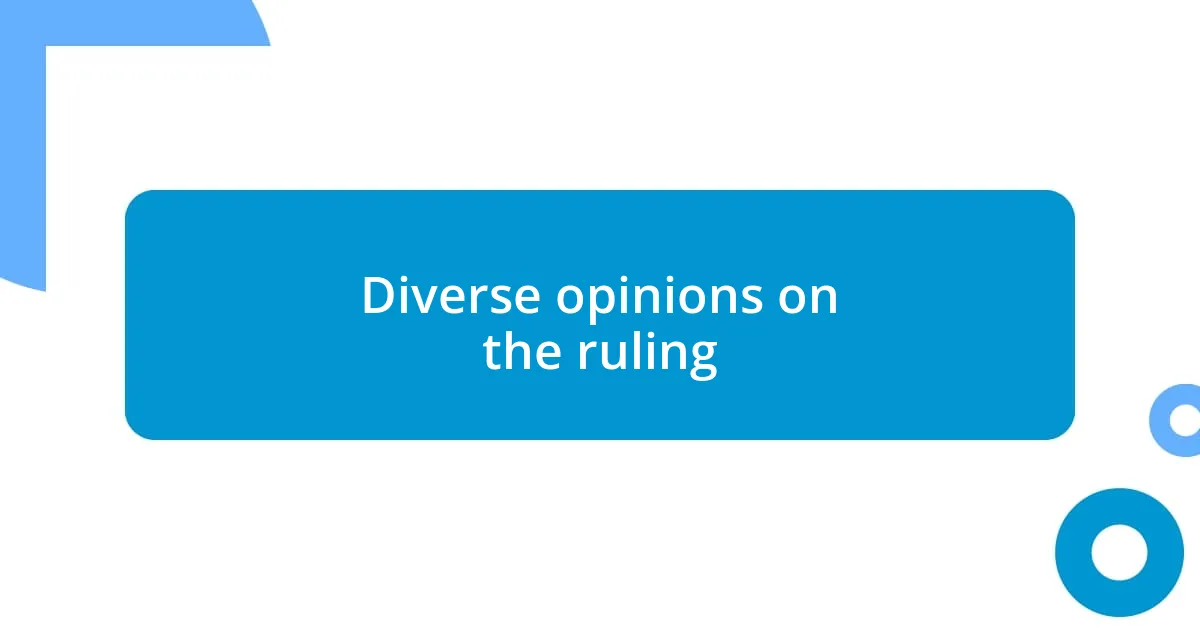
Diverse opinions on the ruling
I’ve had countless discussions with friends and family about the Citizens United ruling, and it amazes me how opinions can diverge so widely. Some argue it has enhanced democracy by allowing more voices into the conversation, claiming that more money in politics fuels diverse viewpoints. But then, I often find myself questioning—are these really diverse voices or just the echoes of those with vast resources drowning out the rest of us?
In my experience attending local community events, I’ve seen firsthand how different perspectives emerge. Some participants believe that the ruling empowers grassroots movements to gain traction, while others feel that it has made it nearly impossible for smaller candidates to compete. I recall standing next to someone fervently arguing that larger funds equate to influence, while I pondered if our smaller, community-driven messages were being stifled. It leads me to wonder: can true representation exist in a landscape where dollars speak louder than voices?
Reflecting on my own voting habits, I can’t help but feel torn. I’ve heard passionate advocates for and against Citizens United—some feel liberated by the financial support for candidates they believe in, while others express despair over corporate interests monopolizing the political platform. This tangled web leaves me reflecting on how my choices and beliefs could be swayed by such overwhelming financial influence. I constantly ask myself, are my values truly represented, or am I merely a bystander in a system that favors wealth?
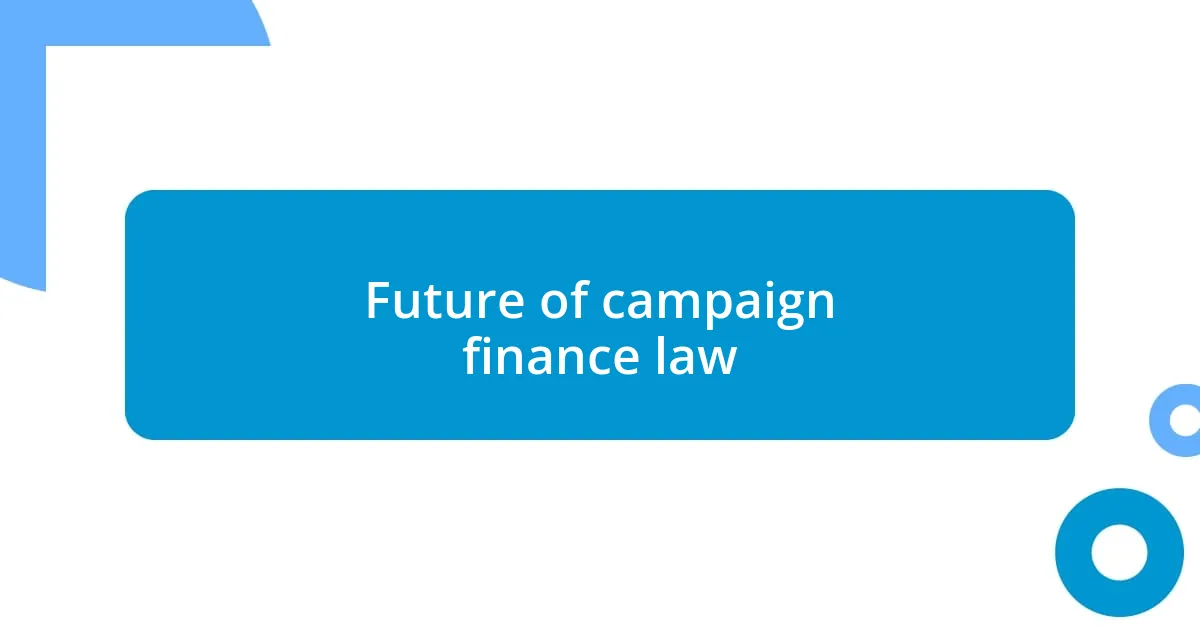
Future of campaign finance law
As we look ahead to the future of campaign finance law, it’s hard not to feel a sense of unease. I remember attending a town hall meeting recently, where a candidate openly discussed the struggle to fund their campaign without succumbing to corporate donations. It got me thinking: if this is how local politics operates, how can we expect any change at the national level? The need for reform feels more urgent than ever, yet potential solutions remain elusive.
One area that piques my curiosity is the role of digital fundraising platforms. These days, candidates can quickly rally small donations from supporters across the country. I’ve even contributed to a few myself. It seems like this could level the playing field, allowing grassroots efforts to thrive. But then I wonder—can this approach truly compete with the overwhelming financial power of big corporations? Will these platforms simply evolve into new forms of influence?
Ultimately, the potential for changes in campaign finance laws hinges on public sentiment and activism. During a recent discussion with my friends, we raised the question: how do we advocate for transparency in political funding without risking our freedoms? I’ve seen some grassroots organizations work tirelessly to push for reforms, stirring up a sense of responsibility within the community. Yet, as I reflect on their efforts, I find myself contemplating—will this be enough to shift the tides in a system so deeply entwined with money?












